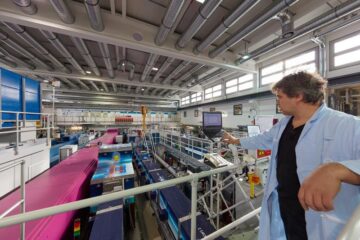The future of pan-European research

The event, entitled ‘Can the European Dimension in the Research Agenda be Delivered?’ is being held in Munich as part of the EuroScience Open Forum.
Noted speakers include Professor Ian Halliday, President of ESF and University of Edinburgh lecturer; Professor Antje Boetius of the International University of Bremen; Dr Svetlana Berdyugina, of the Swiss Federal Institute of Technology (ETH) and Dr Svenya Mehlert of ESF.
Using real examples from a range of disciplines, this session will develop from a view of the way in which science agendas are set and some of the ways in which these agendas can be achieved.
Two methods of achievement will be presented; firstly the creation of collaborative research programmes, taking an example from the EUROCORES scheme to show scientific impact from a collaborative project, and secondly the creation of a collaboration between organisations which enables outstanding young researchers to establish research teams working at the forefront of European science.
Topics for discussion include ‘Plotting the future: the Nano-Medicine Forward Look’; ‘Establishing trans-national research programmes – the EUROCORES scheme experience’; and ‘Excellence in Europe: Solar and Stellar Magnetism’.
Professor Halliday said: “A European Dimension is today essential at both European and national levels for the development of new directions in basic research.
“Governments and research funding agencies no longer expect to take their decisions based on a purely national basis. In additional to the global nature of scientific endeavour, many research priorities span national and regional boundaries and an increasing number require coordinated approaches to funding.“
Media Contact
Weitere Informationen:
http://www.esf.orgAlle Nachrichten aus der Kategorie: Veranstaltungsnachrichten
Neueste Beiträge

Bakterien für klimaneutrale Chemikalien der Zukunft
Forschende an der ETH Zürich haben Bakterien im Labor so herangezüchtet, dass sie Methanol effizient verwerten können. Jetzt lässt sich der Stoffwechsel dieser Bakterien anzapfen, um wertvolle Produkte herzustellen, die…

Batterien: Heute die Materialien von morgen modellieren
Welche Faktoren bestimmen, wie schnell sich eine Batterie laden lässt? Dieser und weiteren Fragen gehen Forschende am Karlsruher Institut für Technologie (KIT) mit computergestützten Simulationen nach. Mikrostrukturmodelle tragen dazu bei,…

Porosität von Sedimentgestein mit Neutronen untersucht
Forschung am FRM II zu geologischen Lagerstätten. Dauerhafte unterirdische Lagerung von CO2 Poren so klein wie Bakterien Porenmessung mit Neutronen auf den Nanometer genau Ob Sedimentgesteine fossile Kohlenwasserstoffe speichern können…





















